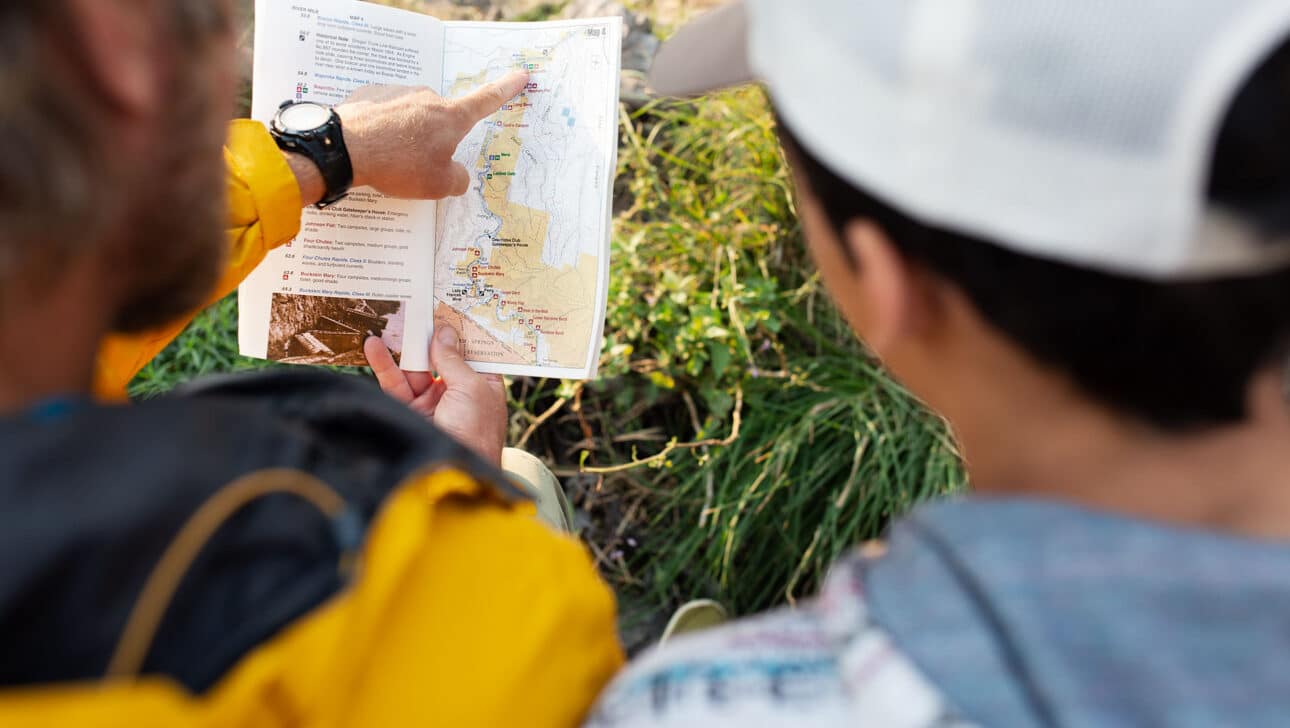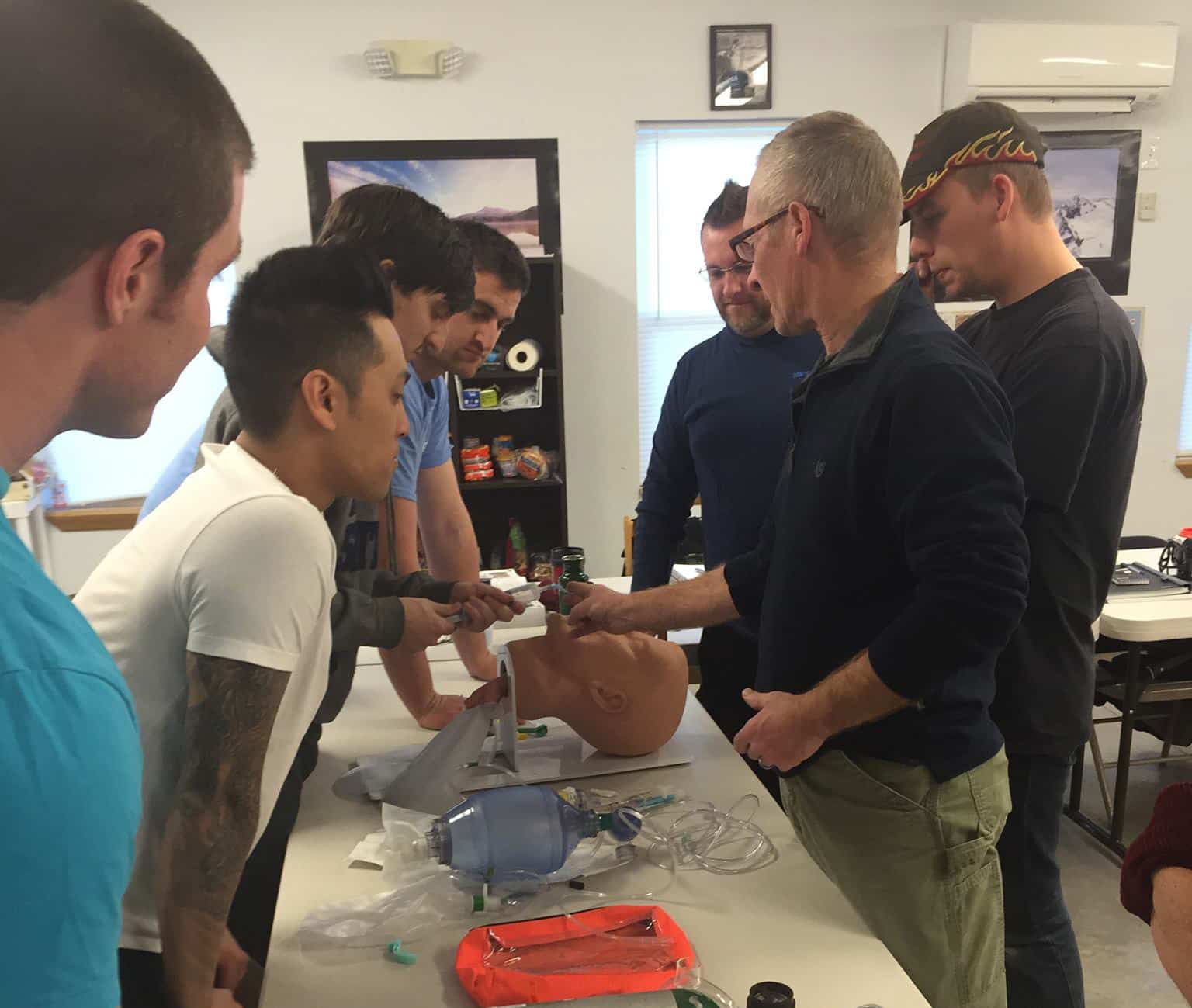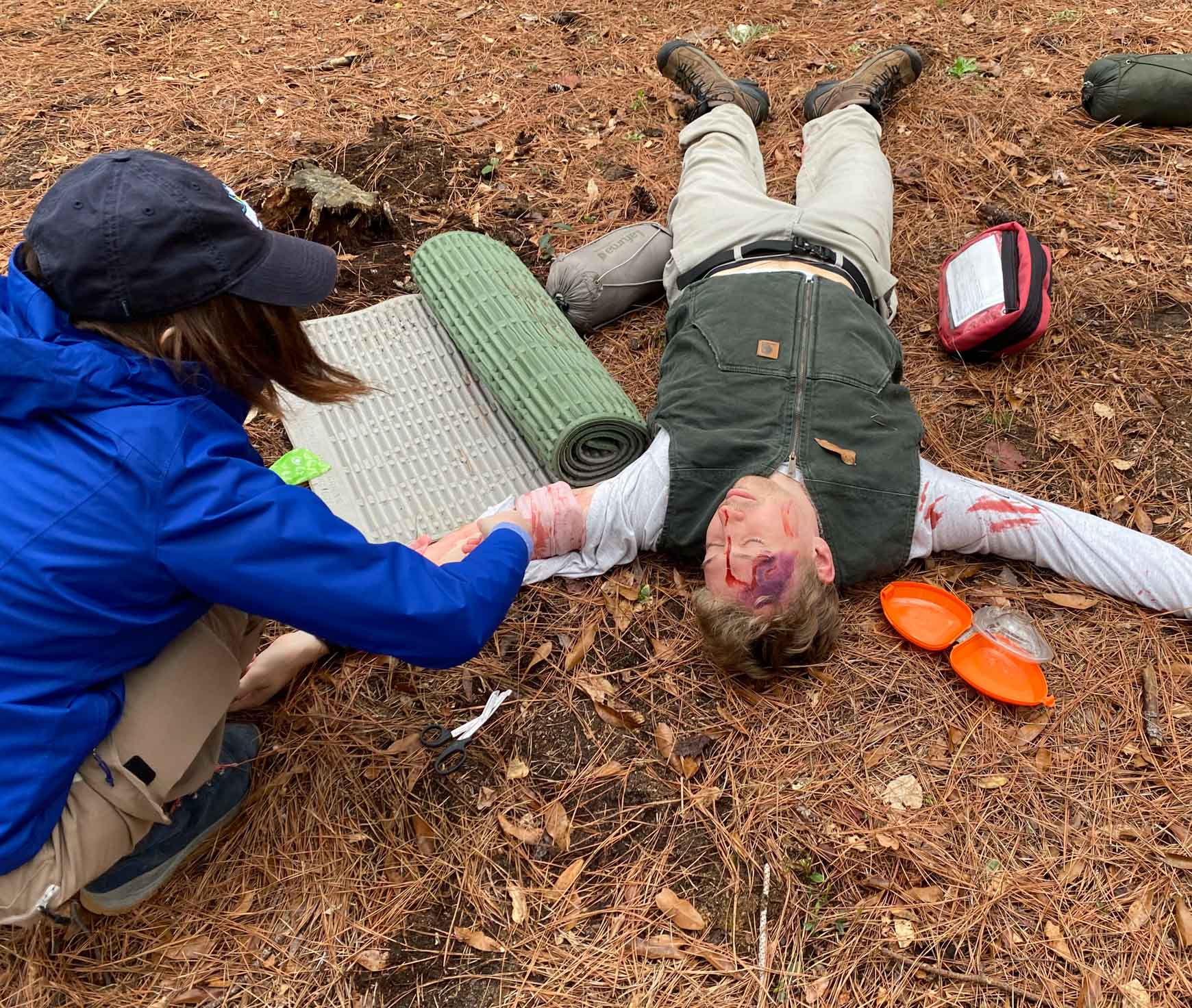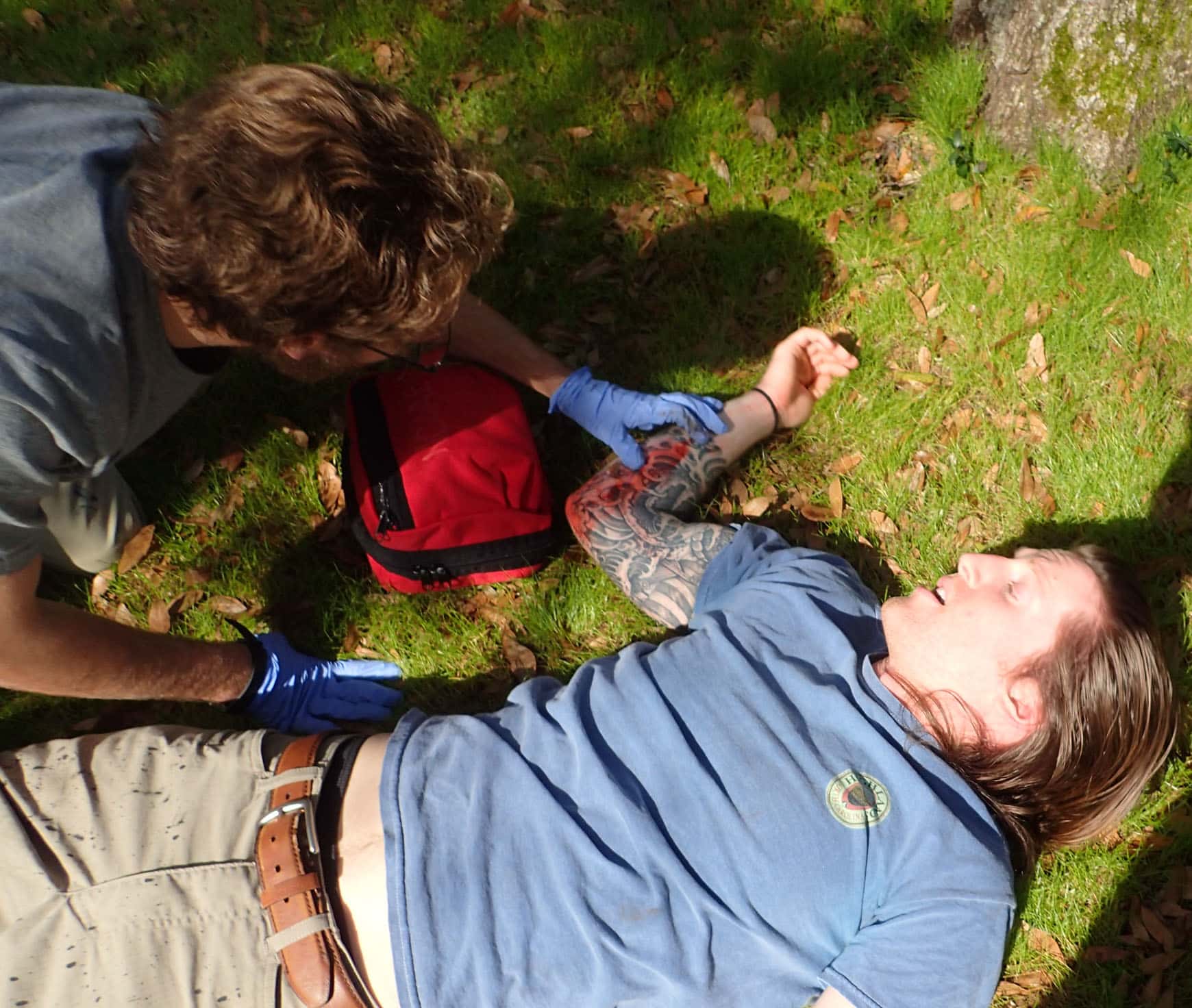Emergency Medicine
‘Intensive’ EMT (Hybrid) – Idaho
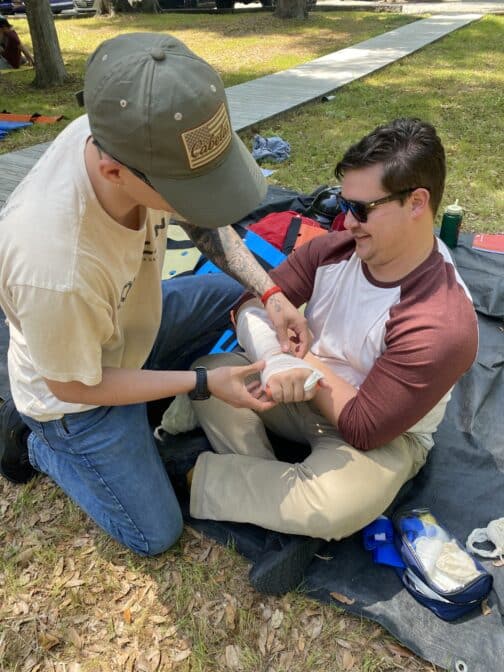
IDAHO EMT COURSE: NATIONAL REGISTRY CERTIFIED
Adventure First
The National Center for Outdoor & Adventure Education (NCOAE) is approved by the National Registry of Emergency Medical Technicians (NREMT) to offer this 21-day virtual instructor led Hybrid EMT training.
The training satisfies eligibility requirements for the National Registry and State EMT certification. NCOAE offers this efficient and effective Hybrid EMT training, by combining both 10 days of virtual instructor led training with a 11 day practical skill sessions at our campus in Idaho. Students will also complete 25-30 hours of pre-course training before beginning virtual instruction.
Successful completion of this training includes the awarding of the following certifications and certificates of completion:
- Initial EMT Training Certificate of Completion
- Traffic Incident Management (TIM) Certificate of Completion
- Coaching the Emergency Vehicle Operator 4: AMBULANCE (CEVO4) Certificate of Completion
- American Heart Association (AHA) Basic Life Support (BLS) Provider Certification, valid for 2 years
- FEMA IS-100.C: An Introduction to the Incident Command System Certificate of Completion
- FEMA IS-200.C: Basic Incident Command System for Initial Response Certificate of Completion
- FEMA IS-700.B: Introduction to the National Incident Management System Certificate of Completion
- FEMA IS-800.C: National Response Framework Introduction Certificate of Completion
- FEMA IS-5.A: An Introduction to Hazardous Materials Certificate of Completion
NCOAE’s EMS instructors are certified Emergency Medicine professionals ranging from EMTs to Paramedics and RNs and are the best in the industry. They have experience in EMS, hospital, fire service and military settings. Through the virtual platform and in person, they provide expert instruction and individualized training to ensure your EMT training experience meets the high expectations of all NCOAE courses.
HOW THIS COURSE WORKS
NCOAE’s team designed this accelerated, Hybrid EMT training course to be both comprehensive and efficient. The curriculum is divided into 3 phases:
- Phase 1: Pre-Course- 30-35 hours of asynchronous, web-based training in order to prepare students for the intense 21-day program.
- Phase 2: Virtual Instruction- 10 days of remote, virtual instructor-led training, culminating in a computer-based final exam.
- Phase 3: Hands-On Practical- 11 consecutive days of in-person training culminating in comprehensive psychomotor testing. Includes up to 16 hours of clinical/field experience with local hospital and EMS systems.
EDUCATION ALWAYS
All students who successfully complete this course will receive a certificate of completion, allowing them to sit for both the NREMT and Idaho state credentials.
Students earn the following certifications during the course: AHA BLS/CPR for Healthcare Providers; Coaching the Emergency Vehicle Operator 4: Ambulance (CEVO4); Traffic Incident Management (TIM); FEMA IS-5, IS-100, IS-200, IS-700, IS-800.
Course topics will include, but are not limited to: patient assessment, body systems, medical emergencies, trauma, medication administration, automatic defibrillation, environmental medicine, and toxins.
This course meets all initial EMT education requirements for the National Registry of EMTs, National Highway Traffic Safety Administration (NHTSA), and the State of Idaho Office of EMS standards.
Is virtual training not for you? Check out our fully in-person ‘Intensive’ 21-day EMT Training.
Course Details
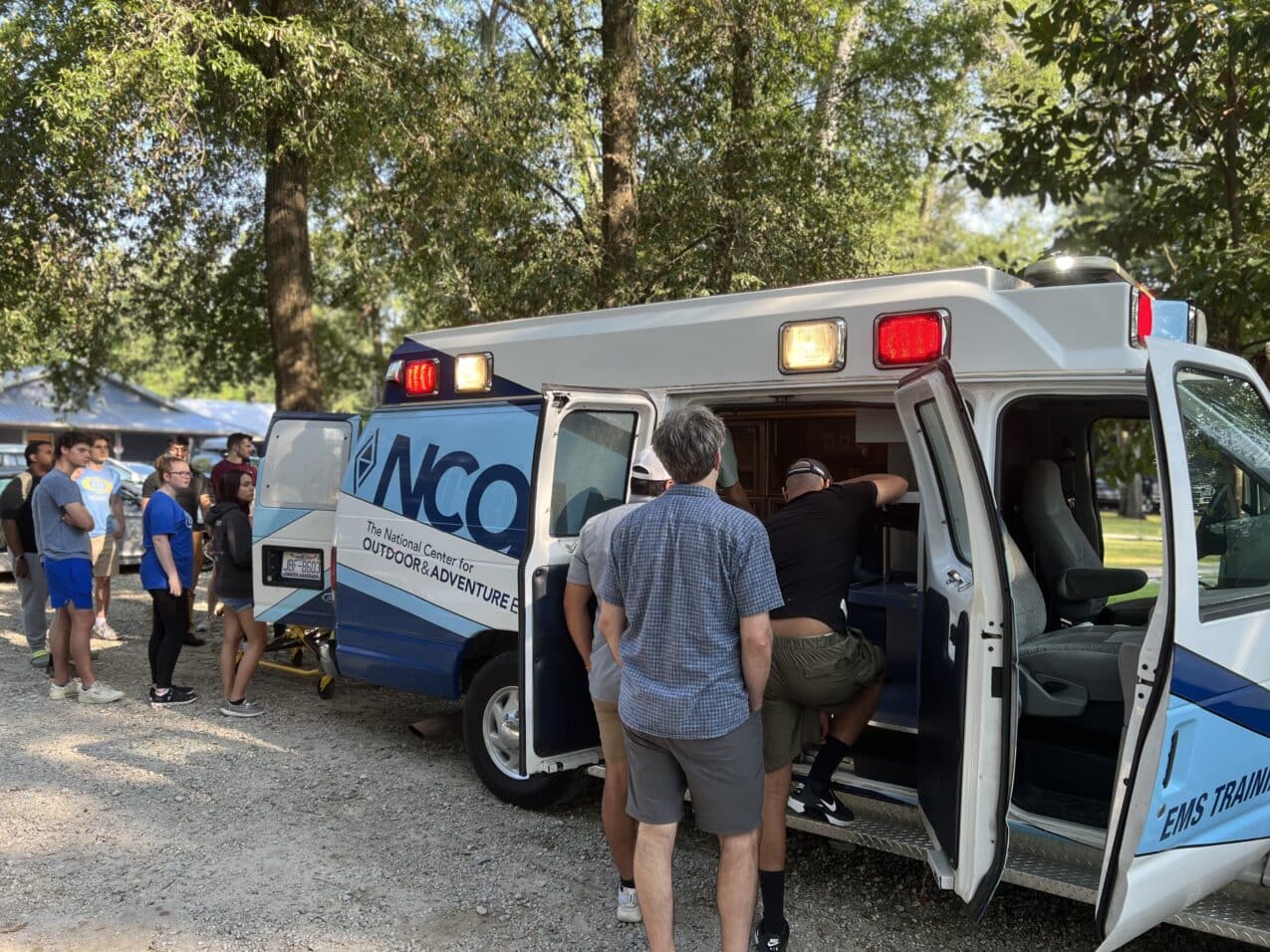
Highlights
- Pre-course: Students must complete 30-35 hours of asynchronous web-based training using NCOAE’s e-learning site.
- Days 1-10: Virtual instruction. Lectures and activities are conducted remotely, in real time utilizing VILT software. Students must pass several module exams and a comprehensive final exam in order to complete this phase.
- Short break to allow students travel time to our Idaho campus. There is no onsite housing at our Idaho campus. There are a variety of hotels and rental properties within Emmett, Idaho.
- Days 11-14: In-person, hands-on skills training. You’ll apply everything you learned so far and put it all together, learning to assess and treat a variety of medical emergencies.
- Day 15-18: Clinical and field experience. Students complete up to 16 hours of clinical time in the area emergency departments and on board EMS ambulances, applying their skills in real life under the guidance of trained preceptors.
- Days 19-20: Psychomotor skills review and testing. Idaho EMS education standards require students undergo and pass psychomotor testing and hands on skills evaluation. You’ll demonstrate what you’ve learned by completing full scenarios involving assessment, treatment and transport of a patient undergoing a medical emergency.
- Day 21: Graduation! Certificates, pictures, hugs and high-fives!
On the Map
- NCOAE Emmett, Idaho
Talk to Us
Have any further questions about the course location, what you'll learn, or what else to expect? Contact us, we're here to help!
Hybrid “Intensive” EMT Course Video
DATES
FAQS
Frequently Asked Questions
What is the difference between this Hybrid 21-day Intensive EMT course and the standard 21-day Intensive EMT course listed on the website?
Currently, only the Hybrid EMT course is offered in Emmett, Idaho. The first 10 days of the Hybrid course will take place online, through our virtual instructor led training. Then the next 11 days of the course take place at the NCOAE campus and feature a hands-on, practical skills component.
All 21 Days of the Standard 21-day EMT training take place fully in person at the NCOAE campus in Wilmington, NC.
Will I complete the National Registry (NREMT) Exam before leaving NCOAE?
No. EMS educational institutes across the country are not legally permitted to administer this exam. To take the National Registry exam, you must create a profile on the NREMT website and submit an application for certification as an EMT. Upon successful completion of your initial EMT training, NCOAE will verify your application and you will receive an Authorization To Test (ATT) explaining how to schedule your exam. NCOAE will help guide you through this process during your training.
Does tuition cover the cost of the NREMT Exam?
No. Not everyone decides to take the NREMT exam, therefore it is not included in the cost of tuition.
What pre-requisites do I need to have to attend this training?
Pre-requisites – Students must:
- Be a minimum of 17 years of age on or before the end date of the course. Please note that North Carolina will allow 17 year-olds to complete training/testing, but will hold the credential until the individual turns 18.
- Have a high school diploma or equivalent.
- Provide documentation of vaccination for MMR, HBV, Varicella (vaccination or prior Chicken Pox infection), and Flu (October-March). Students who have started the HBV series meet the requirement.
- Provide documentation of Tuberculosis screening (skin test or chest x-ray result) conducted within 12 months of course completion date.
- Complete a 10-panel or greater urinalysis drug screen within 6 months of course completion date.
- Complete criminal history background check with CastleBranch.
- Complete all assigned pre-course training.
What is the average age of students?
On average between 18 and 30 – but we commonly have older students as well.
What kind of time off will we get during class?
Time off depends on the day’s schedule and your evening time management. There is a short break every hour and a 1 hour lunch break. Expect to typically be in class around 7 hours a day, then spend several hours in the evenings studying and completing online material. Students generally have very little free time during our course.
Should I buy the workbook for the course textbook?
You do not need the workbook for your course textbook but you do need the course textbook. Please check your reservation email once you are registered for our current required textbook.
In the event that I do not pass my first NREMT exam attempts will the school assist me with resources and recommendation for retesting?
Yes, we monitor all test scores from our students and are happy to serve as a resource.
Who takes the Hybrid 'Intensive' EMT course?
The EMT certification is required by many rescue and law enforcement entities, lifeguards, ski patrol, athletic trainers, as well as recreational guides and of course ambulance medics. Many folks come to us for a strong foundation in EMS training before they go on to advanced training.
If I have a current WFR certification, does this training upgrade me to a WEMT?
It depends. If you have successfully completed one of our WFR courses and your certification has not yet expired, then yes; you will automatically upgrade to a WEMT until the original WFR certification expires. Your wilderness upgrade (WEMT) expiration date is the same as your original WFR certification expiration date.
If you received your WFR certification from another provider, you will need to contact that provider after completing your EMT course and provide them with proof of successful completion of the EMT course. That provider will determine whether or not you may be upgraded to a WEMT.
Are financial scholarships available for the EMT course?
No, not at this time.
Is college credit available for this course?
Yes. It is common for students enrolled in other universities to submit paperwork to the completed by our administration to receive appropriate credit.
What is the cost for the 21-day Hybrid 'Intensive' EMT course?
Tuition is $3,095.00 for the EMT course. This does not include the required
textbook, vaccinations, drug screen or background check.
Are meals for the on-site portion of the course included in the cost of tuition?
No. A grocery store, coffee shop, and several fast-food, and casual dining options are within walking distance from our course site.
What are my housing options at NCOAE's base, for the on-site portion of the course?
NCOAE does not have on-site housing options available for our Idaho 21-Day Hybrid EMT practical.
There are several options nearby our base to stay, including hotels, RV parks, and campgrounds. Contact our office and we can recommend hotels and campgrounds close by.
What are my housing options if I stay off campus, for the on-site portion of the course?
There are a variety of rental options and hotels in the area. If you’re
searching online, check out options in Emmett, Idaho.
Contact our office and we can recommend hotels and campgrounds close by.
What kind of computer/internet access do I need?
You will definitely need a functional computer and reliable internet access for the duration of your virtual training. We recommend a laptop or desktop, but students have successfully used tablets. For the virtual portion, you MUST have a functional webcam and be able to run Zoom and our course website simultaneously. We have found that Chrome and Firefox work best for most applications.
Do I need a car during practicals?
You are responsible for your own transportation for the duration of the course. That includes getting to/from all clinical rotations which are at a variety of locations throughout the region. Some of these rotations may be scheduled with other students, but some will not. Having your own vehicle is ideal, but students have successfully used options like Lyft or Uber. If you are carpooling with a friend and sharing a vehicle, let us know and we will do our best to work with you. You should not plan on relying on other students for your transportation.
Is the COVID-19 Vaccine Required?
At this time, the COVID-19 Vaccine is not required, though it is recommended.
Are there any additional fees for this course?
Tuition does not include the following items and out-of-pocket costs may apply:
- Course Textbook
- Background Check & Drug Screen
- Lodging (if applicable)
- Updated vaccines & immunization test (if applicable)
- NREMT exam fees (if applicable)
- Fingerprinting (if applicable)
For more information on estimated costs for any of the above potential out-of-pocket costs, please email studentservices@ncoae.org.
